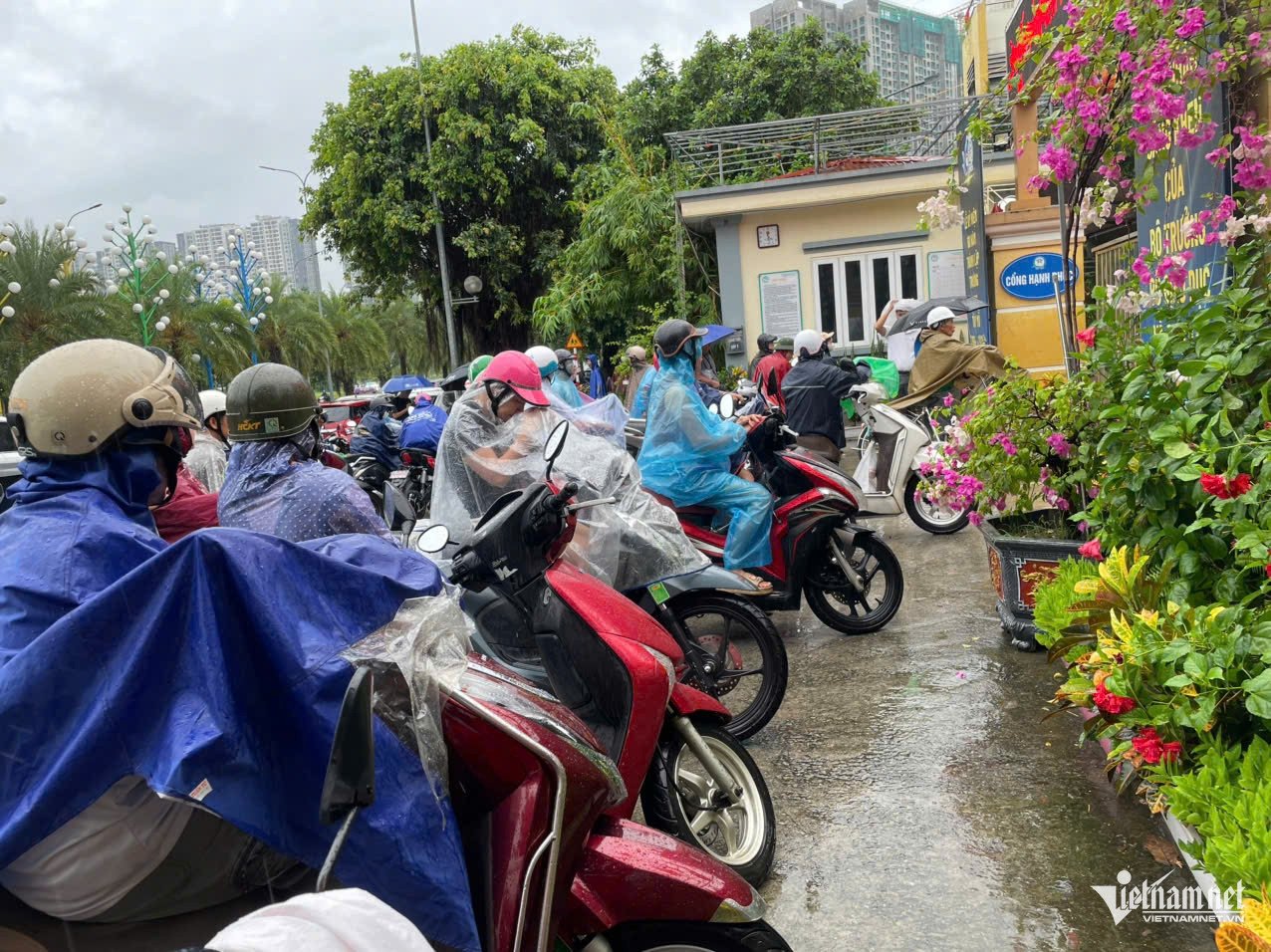According to new regulations of the Ministry of Education and Training, schools are not allowed to arrange more than 7 periods/day to improve the quality of formal education , limit rampant extra teaching and learning, and create conditions for students to develop comprehensively.
However, entering the new school year, many parents are upset because there are days when their children finish school too early (from 3:20 pm) but still have to go to school on Saturday. In Ho Chi Minh City, in response to parents' complaints, the Department of Education and Training quickly made adjustments: Requiring schools not to let students finish school before 4 pm and after 5 pm, and temporarily suspending classes on Saturday; allowing schools to flexibly arrange timetables, even exceeding 7 periods/day when necessary. Meanwhile, the Ministry of Education and Training has not officially spoken out, and the Hanoi Department of Education and Training has yet to make any adjustments.
After a series of articles reflecting on the disruption of school schedules, VietNamNet received hundreds of mixed comments, revolving around many aspects: Study pressure, students' rest time, inconvenience in family pick-up and drop-off, and school autonomy.
Many parents worry that children do not have weekends off.
Many parents believe that school schedules that last until Saturday do not give children a real day off.
Reader Oanh Tran was upset: “On weekends, children should be allowed to rest but they have to go to school. We should reduce STEM programs, life skills… and focus on core subjects so that children are not overloaded.”
Another parent, Ms. Hai Anh, compared with her time: “In the past, primary, secondary and high school students only studied half a day, and the other half was self-study or extra classes if they wanted. Now, boarding schools are full-day but still have classes on Saturdays, while private schools have holidays. Do we need quality or just focus on teaching the required number of hours?”

Many families also reported increased costs and pressure for transportation. One reader shared: “Since the beginning of the year, my child’s school announced that classes will be held all day on Saturdays, and transportation costs have increased by 300,000 VND per month. Saturdays are usually the days my child can rest, but now they have to rush to class. Not only is it expensive for the family, but it is also difficult to arrange a weekend schedule.”
Not only students, many teachers also wish to have two full days off on the weekend. Teacher Anh Trang (Hanoi) said: “On Saturday mornings, I can only go home after the 5th period, and many days I have meetings in the afternoon. I want to go home on the weekend but I can’t. Saturdays are very tiring, I hope there will be instructions so that students and teachers can have a weekend off.”
Many comments emphasize the value of weekends for family activities and practicing skills outside the classroom. One reader wrote: “Family is the ‘cell of society’, children need to have Saturdays off to help with housework, learn to swim, play sports , and develop life skills.”
Meanwhile, reader Nguyen Khang wondered: “Adults get Saturdays off, so why do we force children to go to school? Sometimes my family wants to go back to the countryside or let the children go on picnics with friends, but because the children have to study, we have to postpone it.”
These frustrations show that concerns lie not only in the amount of study but also in the impact on family life.
Some parents also believe that students are forced to study on Saturdays due to the integration of extra subjects into regular school hours. Reader Long Tran reflected: “I looked at my child’s timetable and saw that English and STEM subjects were inserted between regular school hours. If parents did not register, the children had to sit in the yard and wait. It was completely unreasonable,” he said indignantly.

Besides the wave of indignation, there are also readers who think that each family needs to proactively arrange and help their children adapt , because "the school schedule cannot meet everyone's needs."
Reader Hong Ha frankly said: “If we study one session, parents wonder who will take care of us the other session. If we study two sessions, they complain that it is too much. If we finish school at 3:30 p.m., they say they can't pick us up; if we let them study until 5 p.m., they say it is too much. If we improve our skills, they say it is not necessary. If we extend the 7 periods to Saturday morning, they refuse. What should we do in the end?”
Another reader gave an example: “My nephew in Australia finishes school at 2:30-3:30 p.m., and the after-school care is very expensive, but we have to accept it. School is not a marketplace where parents can choose any time they want.”
Parent Như Trần (HCMC) also believes that children should be taught to be independent: “If your child finishes school early, teach them to go home by bus or bicycle. This will reduce traffic jams caused by crowded shuttle buses and help parents relieve pressure.”
Suggested solutions from readers
Reader Minh Thi suggests: The Ministry of Education and Training should have clear regulations for associated subjects, not integrating them into regular school hours so that parents can proactively pick up their children or let them go home early. Reader Ben Nguyen hopes to reduce the curriculum and include skills and health classes - such as martial arts, drawing, music, singing - in regular school hours.
In particular, many people support cutting down the program or adjusting the weekday schedule so that students have Saturday off. Reader Van Khoa emphasized: "The Ministry of Education and Training should issue regulations requiring Saturday and Sunday off like summer vacation, then rebalance the program."
Meanwhile, a parent named Pham Minh suggested: "The total curriculum of 29 periods, arranged in 5 mornings and 3 afternoons is enough; the remaining two afternoons are for free tutoring of good or weak students."
Some other opinions suggest a neutral solution: opening libraries and activity rooms for students to wait for their parents after work, or delaying morning class time instead of letting it end early, helping to reduce traffic jams and making it more convenient to pick up and drop off.
The debates show that changing school dismissal times and maintaining Saturday classes are not only related to the curriculum but also affect family life and costs. Although it is difficult to find a solution that satisfies everyone, the common point of opinions is that the education sector will soon issue unified and transparent regulations, ensuring teaching quality while still respecting the need for rest for students and their families.
Source: https://vietnamnet.vn/phu-huynh-tranh-luan-gay-gat-ve-viec-hoc-thu-bay-thoi-khoa-bieu-nhieu-bat-cap-2442671.html







![[Photo] Prime Minister Pham Minh Chinh attends the groundbreaking ceremony of two key projects in Hai Phong city](https://vphoto.vietnam.vn/thumb/1200x675/vietnam/resource/IMAGE/2025/9/27/6adba56d5d94403093a074ac6496ec9d)



































































































Comment (0)